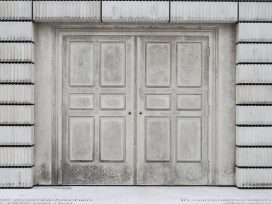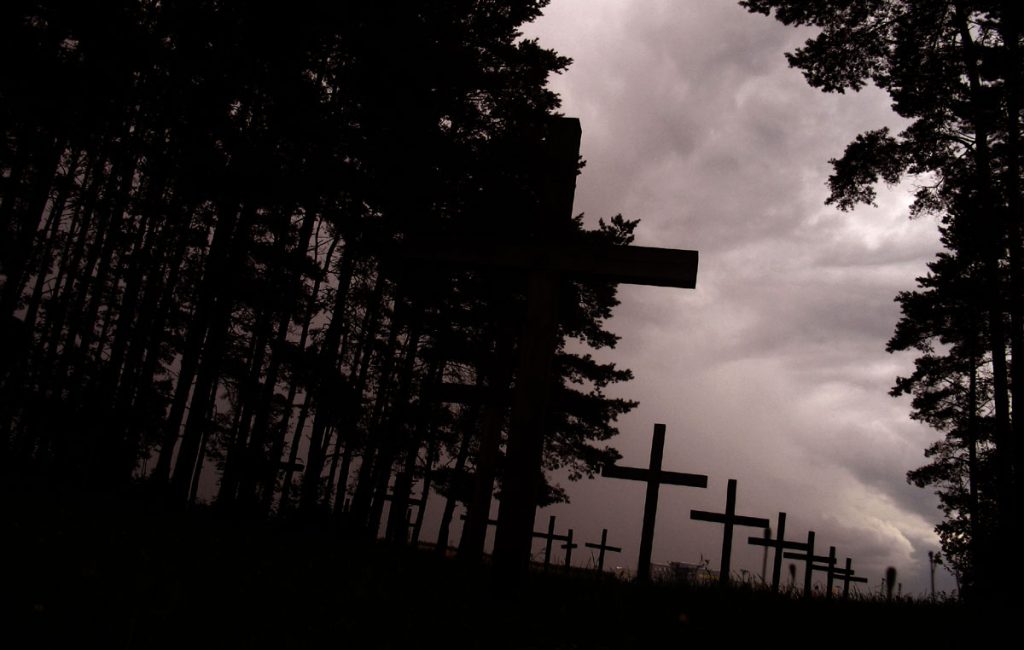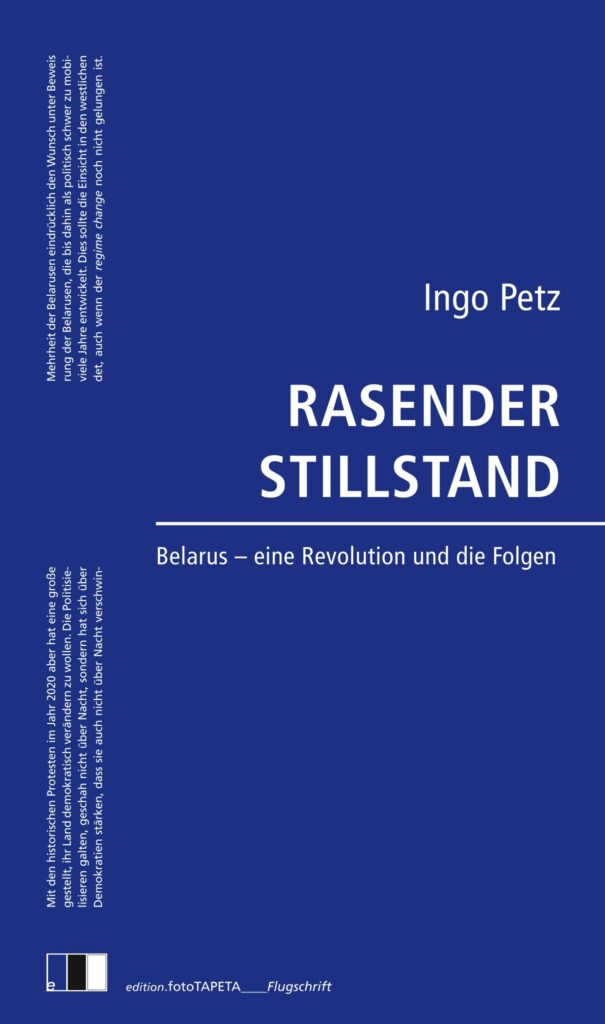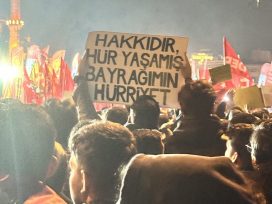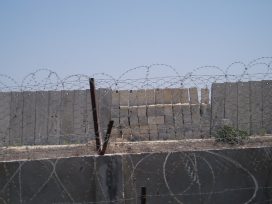In early April 2021 the Belarusian author Victor Martinovich wrote an article for the news portal Budzma, in which he poured out his anxiety about what was happening in his country. ‘Every new morning is a challenge: Are you still human? Are you still free? Everything is forbidden, even reporting the activity on the streets. We are forbidden from setting foot outside on the wrong day.’
The regime, he realized, was shutting down all opportunities for self-fulfilment and engagement. He had never experienced anything like it: ‘For the first time, there are no longer any niches.’ The spaces that had acted as sanctuaries for alternative identities and ways of life were being closed off. The aim was to prevent the critical mass that had built up since the beginning of the large-scale protests nine months ago from voicing any kind of opposition. The spirit of resistance was to be stifled, if not banished from people’s minds altogether. To achieve this, violence and oppression had to become the primary mechanisms of rule.
Increasingly heavy punishments and ever more laws and amendments curtailing basic freedoms have been an integral part of the Lukashenka regime since it started on its authoritarian trajectory. But what has happened since 2021 is of a whole new order of magnitude. Article 23.34 of the Code of Administrative Offences (renumbered 24.23 in March 2021) prohibiting ‘participation in and organization of unauthorised mass events’ was used to convict the vast majority of the tens of thousands protestors arrested, so that as the revolution progressed it came to be known as the ‘people’s paragraph’. Those convicted under this offence were generally sentenced to 15 days in prison, a fine or community service.
When this ceased to be an effective deterrent, the parliament tightened the law, increasing the punishment to up to 30 days imprisonment. The financial penalties were also drastically raised to 100 base amounts (approximately 1100 US dollars in 2021) for participation in an unauthorized protest, and to 150 base amounts for the organisation of such a protest. If one is convicted three times under the article, the public prosecutor may launch criminal proceedings, which can lead to a prison term of up to six years.
The article has also been used to penalize individuals who publicly display the colours of the white-red-white national flag that became the symbol of the protests (although the flag itself has not been formally outlawed). The same goes for the Pahonia – the national emblem of the Belarusian Democratic Republic of 1918 – and the opposition battle cry ž
hyve Belarus! Long live Belarus! In such cases, individuals are charged with organizing an unauthorized one-person demonstration. People have been fined or given prison terms for posting the flag on a
Telegram channel, wearing red and white socks, carrying red and white umbrellas, hanging red and white towels out to dry on their balconies, and handing out sweets in red and white wrappers. PEN Belarus has established that in 2021, individuals tried for such offences were handed down prison sentences totalling at least 2589 days and fines totalling 53,000 euros.
‘Anti-extremism’
In May 2021, the regime tightened the ‘extremist’ provision in the penal code (Article 361–4), which was introduced in 2016 but had only been deployed occasionally. The sole purpose of this statute is the political persecution of undesirable individuals, organizations, media, books, and websites, and the social media channels of analysts, journalists, politicians and activists on platforms like Telegram. Even chat channels are declared ‘extremist’. In November 2024, the list of ‘extremist materials’ numbered 6565 items and was over 1400 pages long.
It is a criminal offence not only to set up an ‘extremist organization’, but also to be involved in one; the punishment is up to six years’ imprisonment. Journalists, media organizations and others who fall into this category stand cannot continue to live and work freely in the country. The use or dissemination of ‘extremist materials’, including liking or reposting comments by individuals classified as ‘extremists’, is also treated as an offence and can lead to heavy fines and prison sentences of up to 30 days. ‘Insulting state officials’ or ‘the President’ are also treated as ‘extremist offences’, as are ‘discrediting the Belarusian state’ and ‘calling for sanctions’ (penalty: six to twelve years). Although the regime has not yet blocked Facebook, X, YouTube or other digital platforms, increased surveillance and criminalization has led many Belarusians to comb through their timelines, deleting posts or Telegram subscriptions that could cause them problems.
It is also illegal to donate to and receive aid from ‘extremist organizations’ or ‘international organizations’. People charged with this offence – for example those sent food parcels by the US diaspora organization INeedHelpBY – are visited by the KGB, charged with fines, detained pending trial, and placed on Ministry of the Interior lists of citizens considered disloyal to the regime. They have lost their jobs and have almost no chance of finding new work, especially outside the cities. In 2023, around 740,000 people lost their jobs as a consequence of the repression, according to a report by the UN Human Rights Council. People who received assistance with legal fees from Bysol (the Belarus Solidarity Foundation) after being arrested in 2020 have also been prosecuted. Family members of political prisoners convicted of accepting assistance are likewise being pressurised and prosecuted.
Almost 5,000 individuals have been declared ‘extremist’ since 2021. The Ministry of the Interior updates its list every Friday. Many of the media outlets that were forced to leave the country during the repression and that are now operating out of Poland, Lithuania, Latvia and Georgia have been declared ‘extremist associations’. These include not just independent Belarusian media but also Deutsche Welle, Germany’s state-funded foreign language service. Also declared extremist are the political structures of the new democracy movement and independent civil society organizations. Belonging to the latter category are PEN Belarus, the Belarusian journalists’ association BAJ, and the human rights organization Viasna, which meticulously analyses and documents cases of political persecution. Ales Bialiatski, who founded Viasna in 1996 and was awarded the Nobel Peace Prize in 2022, was sentenced to ten years in prison in March 2023.
Radio Svaboda has established that the youngest convicted ‘extremist’ was 16 years old and the oldest 82. ‘The lists include entire families (3–4 people each, for example a father and children). There are numerous mothers with children on the lists, as well as people who are seriously ill or with disabilities.’ In the three months from July to September 2024, human rights organization Human Constanta recorded at least 142 new criminal proceedings and 119 convictions for ‘extremism‘. It is unclear what criteria are used to declare people extremists, or organizations and media ‘extremist associations’, or how websites and books become ‘extremist material’.
Creative artists are also subjected to this type of political persecution. Overall, hundreds have been arrested in the course of the clampdown. One of the best-known cases is Tor Band, a rock group whose catchy songs have become anthems of the revolution. The lyrics of Uchodi, for example, run, ‘Go away! Peacefully, quietly and silently / Go away! We’ll find new men of honour / Go away! Now is the time for the brave, not cowards / Go away! That’s what the Belarusians want!’ The three musicians – Dimitri Golovach, Yevgeny Burlo and Andrei Yaremchik – were arrested in October 2022 and in late October 2023 sentenced to between seven-and-a-half and nine years in prison. Tor Band itself was declared an ‘extremist organization’ in January 2023.
The literary arts are also affected. The writer Alhierd Bakharevich has had the dubious honour of having two of his novels declared ‘extremist material’, including the epic Dogs of Europe, which won the Leipzig Book Prize for European Understanding in spring 2025. In May 2022, his publisher Andrej Janushkevich received a visit from the siloviki (security forces) at his newly opened bookshop in Minsk, for allegedly distributing ‘extremist literature’. After spending 28 days in custody, Januskevich fled to Poland, where he has rebuilt his publishing house.
The regime’s war on alternative culture goes back a long way. It is rooted primarily in the failure of the Lukashenka state to develop an appealing cultural model of its own. The writers, musicians, artists and publishers on the alternative scene have always been miles ahead of the rigid state when it comes to creativity, flexibility and willingness to experiment. ‘This is a conflict between irreconcilable world views and a battle between value systems’, as cultural studies scholar and film critic Maxim Zhbankov put it in an interview with Deutsche Welle.
Political prisoners
The ‘extremism’ laws (Article 361-4) are still the most common means through which the Lukashenka regime prosecutes regime opponents. A total of 21,495 ‘extremist crimes’ were recorded between August 2020 and November 2024. But draconian prison sentences also continue to be handed down to those accused of ‘high treason’ (Article 365) or ‘organizing mass riots’ (Article 293 of the Criminal Code). The overall aim is to prevent Belarusians from collaborating with organizations and people who have been branded extremist and from being inspired by their work and ideas. It is also to prevent the continuation or expansion of dialogue, discussion and information flows between people in Belarus and those in exile.
Participants in the 2020 protests are still being identified, arrested and put on trial. The blogger Ihar Losik was sentenced to 15 years in prison and has already tried to take his own life twice. His wife, Darya Losik, was sentenced to two years in prison for giving an interview about her husband to the Polish-based Belarusian TV station Belsat – which the court deemed as ‘support for extremism’. The lengthiest politically-motivated prison sentence in the history of independent Belarus was imposed in October 2022 by a court in Hrodna. The taxi company operator Mikalay Autukhovich was sentenced to 25 years, among other things for ‘attempting to seize state power by unconstitutional means’, ‘high treason’ and ‘incitement of hatred’. Eleven other people were sentenced alongside him, to a total of 193 years in prison and fines totalling one million US dollars. Autukhovich, who had repeatedly been subjected to state repression before 2020, is a recognized political prisoner.
Since 2020, more than 3,300 political prisoners have been held in Belarusian prisons and labour camps, with the total at any one time reaching up to 1,600. There have always been political prisoners under Lukashenka, but never on such a scale. Two years after the protests that followed the suppression of the December 2010 presidential election, there were only nine registered political prisoners. At the end of 2024 there were 1265. Russia, whose population is almost 16 times the size of Belarus, had 768 registered political prisoners in September 2024.
In order to protect their families, who are afraid they will also fall victim to state repression, many detainees do not permit human rights organizations to declare them political prisoners. Moreover, political prisoners are forced to wear a yellow triangle on their clothing as a mark of shame, and are subjected to humiliation, bullying and deliberate degradation. They are placed in cells with convicted murderers and held under particularly harsh conditions, and are forced to work for state forestry, textile and agricultural enterprises.
Sascha Janouski, a doctor sentenced to a year and a half in prison in May 2022, remembers his first day at the infamous Okrestina prison, which became a symbol of the violence unleashed by the state in the wake of the protests: ‘It was a single cell with a concrete floor, containing nine unhappy people who had just been sentenced. Some were clutching their heads in shock; others had been planning to get married. At night the concrete floor was cold, and to keep myself from getting ill, I slid a broom under my body. It was very cramped; people were lying on the floor like Tetris blocks, so that you couldn’t move. It was impossible to sleep.’
In August 2020, policeman Dimitri Kulakovski resigned in protest at the violence meted out by the Belarusian authorities against the demonstrators. He was arrested and remanded in custody for 27 days. After his arrest he swallowed four metal objects in protest. At his trial, he said, ‘I believe the criminal proceedings against me were fabricated because I resigned from my job at the Ministry of the Interior out of conviction … The conditions I was held in were inhumane, 25 days in prison without medication or medical care.’ Others have reported being interrogated at gunpoint in the forest and being brutally maltreated while being arrested.
Many well-known political prisoners are held in what is known as the incommunicado system, where they are kept in strict solitary confinement and have no contact with the outside world. This is the case for Maria Kalesnikava, one of the three members of the united opposition campaign who was arrested in September 2020 and is currently being held at the Women’s Penal Colony no. 4 in Homel. Her prison conditions have been described by the Belarusian branch of online news outlet Mediazona as follows:
The isolation cell is about 1.6 by 2.5 metres. Two plank beds, for two people each, are attached to the walls; they are only lowered during night hours, from 8.30 pm to 5.00 am. The toilet is a hole in the floor in the corner of the cell, and a sheet of metal the size of an open newspaper serves as a privacy screen. It is not fit for the purpose: no matter how you squat, you are exposed to view.
No word was heard from Kalesnikava for 620 days. Family members and lawyers were not permitted to visit her and she was forbidden to send any letters to the outside. Her father was only allowed to see her again at the end of October 2024. There is no contact at all with other political prisoners. The families and friends of Maxim Znak, Mikola Statkevich and Sergei Tikhanovsky have not heard from them for between 500 and 600 days. They are being held in darkness, a form of psychological torture.
Political prisoners often die in these inhumane conditions. The artist Ales Pushkin, for example, died of a burst stomach ulcer. He is one of at least seven political prisoners to have perished in custody. It is not uncommon to force political prisoners through a second legal process by provoking them to break prison rules and misusing Article 411 of the Penal Code (‘malicious disobedience’) to prolong their detention. So called ‘custodial detainees’, who are sentenced to 30 days’ imprisonment for misdemeanours, also report being beaten during arrest and interrogation, being held in humiliating conditions in cold cells where the lights are kept on at night, and being denied washing facilities, hygiene and menstrual products.
Pressure and intimidation
There are many other means of repression and prosecution. A classic of sorts is Article 243 of the penal code (tax evasion). In the past, it was used to put pressure on independent media. Now it is part of the standard repertoire, used as the basis for locking up opposition figures such as the 2020 presidential candidate Viktar Babaryka, and for getting rid of media, companies and organizations. It also enables convicted parties’ homes and properties to be seized and auctioned off.
The Belarusian authorities have also repeatedly threatened to revoke the citizenship of well-known activists and members of the opposition. Political prisoners’ families are harassed and threatened with the removal of their children. In September 2023, Lukashenka decreed that Belarusians living abroad would no longer be able to obtain new identity documents from the country’s embassies; they would have to return to their home country, where they would very probably be arrested.
Lawyers who take on political cases are targets of repression. Since 2020, the state has disbarred more than 140 lawyers and over 300 have left the profession. The legal system is now being packed with former militia and secret service officers. Open threats and insults are often issued by the enforcement agencies, illustrating just how unbridled and normalized violence has become. In November 2024, employees of the Directorate for Combating Organized Crime used its official Telegram channel to threaten exiled blogger Mikita Melkaziorau, warning that the homes of his relatives would be searched with particular ‘zeal’.
Many could also face arrest and conviction in a second or third round of criminal proceedings: confiscated laptops and cell phones are closely examined by the secret services and law enforcement agencies. Contacts and correspondence are then compared with lists of people with prior convictions and the criminal cases against them. Regardless of the charges, anyone who appears on these lists is dismissed from employment with state-run banks, theatres, hospitals, administrative bodies and agricultural businesses. As a ‘listed person’ it is extremely difficult to find a job, and ultimately the only option is to flee the country.
Such was the fate of the members of the Yanka Kupala State Theatre ensemble, who were fired for taking part in the protests. The actors and directors went into exile and founded the independent theatre group Kupalaucy, which loosely translates as ‘Kupala’s disciples’. Yanka Kupala’s early-twentieth century poems and plays gave expression to the Belarusians’ desire for independence. He died in 1942 in mysterious circumstances, ‘falling down a staircase’ at the Hotel Moskva in Moscow. The Kupalaucy theatre group has been declared an ‘extremist organization’. It is only a matter of time before the regime changes the name of the venerable theatre, which opened in 1920.
The effort to which the authorities and the siloviki have gone to detain particular individuals, their determination and their willingness to take extreme risks, were demonstrated by the spectacular case of blogger and activist Roman Protasevich, who at the time of his arrest in Minsk on 23 May 2021 was editor-in-chief of the Nexta Telegram channel. Protasevich was arrested after the Belarusian authorities forced the Ryanair flight 4978 from Athens to Vilnius on which he was travelling with his girlfriend Sofia Sapega to land in Minsk. Protasevich was subsequently broken and now functions as a regime stooge.
‘Here, the public is being presented with a living example, a potential alternative, by way of illustration,’ commented political scientist Valery Karbalevich on exiled Radio Svaboda. ‘This is what political opponents need to do to be released: show remorse or, as Soviet newspapers wrote in 1937, “disarm” before the regime, “reorient themselves”, swear allegiance and ideally call on people to vote for Lukashenka.’ It is also the regime’s way of demonstrating that the democracy movement in exile is powerless and that only one person has power over political prisoners: Lukashenka.
Lukashenka’s cynicism
Since his election in 1994, the man with the moustache and stilted speeches has been continually underrated and frequently ridiculed; but this has only contributed to his success. In the 1990s, the opposition was convinced they would be rid of the former collective farm manager in just a few years. But Lukashenka is making it abundantly clear: that even after 30 years in power, he should not be underestimated.
The EU responded to the de facto hijacking of an aeroplane with a comprehensive package of sanctions that targeted Lukashenka’s banks, government officials, businesspeople, judges, civil servants, and key state-owned companies such as the Minsk Automobile Plant (MAZ) and the New Oil Company, the only private company allowed to export oil products from Belarus and import oil into the country. For the first time, the international community also imposed sectoral sanctions. This cut off one of the regime’s key sources of income: EU imports of Belarusian petroleum products and potash fertilisers.
But in this case, too, Lukashenka responded to ‘the hostile actions of the West’ with a special operation few would have thought him capable of. He engineered an artificial refugee crisis on the EU border by encouraging Syrians, Iraqis and Afghans to travel to Belarus via travel agencies that promised them an easy crossing from the Belarusian side. By July 2021, more than 4,000 people had entered Lithuania via this route; Belarusians, incidentally, were also using it to flee. According to EU data, at least 47 aircraft from Middle Eastern countries landed in Minsk every week in November 2021. On 26 November, Lukashenka visited the transport and logistics centre near the Brusgi border crossing, where migrants were being temporarily housed. At an impromptu rally, he told them that, ‘if you want to go to the West, we will neither arrest you nor beat you. It is your choice. If you can get through, then go ahead.’
This operation revealed Lukashenka’s cynicism and cunning. While waging war on its own people at home, the regime was abusing the good faith of refugees, sending them to a border zone where they were met with Lithuanian and Polish border guards and forced to spend weeks in the cold forests of no-man’s-land. By the end of 2021, 14 people had died. The migration crisis this triggered gave Lukashenka another strategic advantage: conflicts flared up between EU member states and international reporting was diverted from the political persecution of Belarusians.
In April 2021, in an interview with state broadcaster Belarus 1, the foreign minister Vladimir Makei had threatened consequences in case of further tightening of sanctions. ‘This will mean civil society will cease to exist,’ said Makei. ‘And I believe that would be fully justified under these circumstances … In my view, those who are now calling for sanctions are committing a crime against their own people.’
Makei, who until his death in 2022 held numerous senior posts in Lukashenka’s regime, was seen as the architect of the so-called seesaw policy. In order to counterbalance the country’s growing economic and political dependence on Russia, the regime had occasionally opened up to the EU and other western democracies. These periods of détente were never followed by far-reaching reforms. But political prisoners were released, including prominent opposition politician Mikola Statkevich in 2015 (arrested when standing as a presidential candidate in the 2010 elections and sentenced to six years in a labour camp, rearrested in 2020) and human rights activist Ales Bialiatski in 2014 (arrested in 2011 and sentenced to four and a half years in prison for tax fraud). In addition, civil society and cultural initiatives were given greater freedoms.
After the 2020 revolution, these freedoms were not only curtailed but eliminated completely. The following year was dominated by footage of raids and searches, with masked members of the tax and law enforcement authorities storming into offices and homes, confiscating documents, hard drives and computers. By the summer of 2021, 50 non-profit organizations and institutions had been dissolved or liquidated; by October 2021, their number had risen to 270, and by the end of 2024, it had exceeded 2,000. Along with human rights organizations such as the Belarusian Helsinki Committee, the purge also targeted independent trade unions, environmental and student initiatives, associations for people with disabilities, urban development and historical research projects, the Radislava women’s shelters, the Association of the Polish Minority in Belarus, bicycle enthusiasts, ornithologists – and cultural institutions.
Totalitarian transformation
The regime’s aggression stems from its fear that Belarus’s resourceful civil society sector could become the driving force of another revolution. As in Russia, where the state has been using the Foreign Agents Law to crack down on non-commercial organizations since 2012, and on the media since 2017, the Belarusian regime is obsessed with the idea that ‘the West’ is using civil society to foment revolution. This narrative has been part of the propaganda toolkit since the colour revolutions in Serbia, Georgia, Ukraine and Kyrgyzstan. The repressions are intended not only to spread fear and terror among those prepared to protest, and to bolster the regime’s resolve; they also signal to the Kremlin that Lukashenka can be relied upon – that he is in control and can handle serious crises. By crushing civil society, Lukashenka proves himself a trustworthy partner to Putin as in the preservation of their authoritarian systems, whose political survival depends on states of emergency.
Belarusians have long referred to their own country sarcastically as ‘the North Korea of Europe’. Those who are dissatisfied are still able to leave the country. After all, when critics of the regime emigrate, it consolidates the dictatorship. The free market has not yet been completely abolished, although the government is making greater use of regulatory instruments and economic controls and is not afraid to requisition privately owned companies. Although the state does not yet intrude on all aspects of life, the past five years have brought a rapid and unmistakeable transformation: from an authoritarian regime that permits certain freedoms, into a totalitarian regime that wages all-out war on its opponents and ‘singles out’ anyone who fails the loyalty test. These people lose their livelihoods, their prospects and the foundations of their lives.
This goes for opponents within the regime too. On 9 August 2021, Lukashenka threatened his subordinates, saying, ‘Yes, I realize there are a few still hiding behind the skirting board. Even now. But we will get them. I have spoken honestly and openly about this: we will have no traitors working in the machinery of state.’ Meanwhile, surveillance and monitoring are being extended even further. In an interview with the online portal Zerkalo, Polish journalist and former dissident Adam Michnik compared the Jaruzelski regime with Lukashenka’s rule: ‘We had totalitarianism with a human face, so to speak. In Belarus, they have totalitarianism with Lukashenka’s bestial grin … It’s now -80°C in Belarus. With us, it was -40°C. That’s cold, but not as cold as they have it.’
All this reminds Belarusian society of one of the darkest chapters in its history: Stalinism, another regime that rampaged through Belarus with unimaginable cruelty. The Great Terror deprived Belarusians of the cultural and scientific elite that had emerged under its policy of korenizatsiia, of support for minorities and their integration into the Soviet system. The Belarusians’ sense of national identity, the promise of a future as a nation state, was wiped out by mass shootings like at Kurapaty.
The woods on the outskirts of Minsk have come to symbolize a history of violence that the system has not addressed. The state clings to Soviet myths, keeps KGB files under lock and key, and resists any attempt to come to terms with the past. It makes this clear by repeatedly destroying the crosses erected by activists in Kurapaty in memory of the murdered. It has fallen to courageous scholars and activists to ensure that Soviet crimes are properly investigated, and to foster a new culture of remembrance. They know that violent crimes must be brought into the light; that they must not be forgotten; and that otherwise, the victims will return as restless spirits and continue to wreak havoc. The revolution of 2020 has brought the two opposite forces in Belarusian history – violence and freedom – into head-on collision.
When the countless instances of torture and ill-treatment became known, human rights organizations founded The International Committee for the Investigation of Torture in Belarus. This initiative lobbies the UN and other international organizations to ensure that perpetrators of torture are sometime held to account. In the summer and autumn of 2020, the Investigative Committee of the Republic of Belarus received 5,000 complaints from people who had been mistreated or tortured in detention. It refused to open even a single investigation. The Lukashenka state considers itself untouchable. Five years after the revolution, there is still no indication that those in power might scale back or even curb the repression. On the contrary: in the run-up to the so-called ‘presidential elections’ in late January 2025 – the first elections since the outbreak of the revolution – the regime ramped up the pressure yet further. Over 100 people were detained in the course of two days. And there is no guarantee that, when it comes to the brutality and scale of repression, the limits of the unthinkable will not be pushed further still.
‘Repression behaves like a gas’, wrote political analyst Artyom Shraibman in an article for the Russian online portal Meduza. ‘If there is space for it to expand into, it will permeate every corner until the ruling elites or society offer resistance.’ But such resistance is currently not to be expected. The course has been set by government hardliners, who benefit from it. Since 2020, there has been a significant increase in state spending on the military, secret services, judiciary and law enforcement agencies. For the regime, this means complete transformation: whereas for a long time the touchstone for Lukashenka was the people, now it is the nomenklatura, the elite. They are becoming the sole custodians of the political sphere. For everyone else, politics is strictly taboo.
Contrary to some predictions, the regime is mastering the stress test of operating a permanent machinery of repression, without displaying any obvious signs of wear and tear. The war being waged daily by the regime against its own population is so comprehensive, far-reaching and monstrous that it is barely possible to describe it in its entirety. It is even more difficult to fully grasp the magnitude of human suffering behind each individual case. But the message is clear: no-one can feel safe anymore. The fear of the knock on the door when the KGB turn up at your apartment is a constant companion.
The Belarusian artist and activist Jana Shostak gave powerful expression to the madness, despair and helplessness outside the Representative Office of the European Commission in Warsaw in July 2021. Evoking the atrocities taking place in her home country, she screamed and screamed and screamed.
This is a translated excerpt from Ingo Petz’s book Rasender Stillstand: Belarus – eine Revolution und die Folgen, published by edition.fotoTAPETA (2025). The translation was supported by the S. Fischer Foundation.
